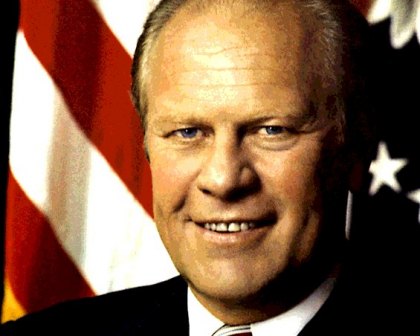3 politicians and votes of conscience

Senators are expected to vote along partisan lines -- with Democrats opting to convict and Republicans to acquit. As there are 51 Republicans and 49 Democrats (including two Independents), it's unlikely that Trump will be removed. Indeed, in order to convict and remove the president, a supermajority of 67 votes is required.
But history gives examples of politicians who have taken risks, ignoring calculations about their political interest and voting for the public good.
President Gerald Ford (1913-2006): When embattled President Richard Nixon resigned amid a scandal over the burglary of Democratic headquarters in the Watergate complex during the 1972 presidential election, Vice President Ford became the commander in chief. Although he was well regarded and a political moderate, Ford's presidency got off to a rough start when he pardoned Nixon. In an interview with CBS years later, James Cannon, Ford's former chief of staff, said the president's staff didn't want him to pardon Nixon "because it would appear to be a deal," the network's website recounts.
The decision to pardon Nixon was unpopular at the time, but Ford said he did it to help the country heal. It was also a political risk. Historians believe the pardon contributed to Jimmy Carter's narrow victory over Ford in the 1976 election. In 2001, Ford was given the John F. Kennedy Profile in Courage award for making the controversial decision. And when Ford died in 2006, Carter delivered the eulogy.
Rep. Marjorie Margolies–Mezvinsky D-Penn. (1942-): These days, the former politician and journalist is known as Chelsea Clinton's mother-in-law. But in 1993, Margolies–Mezvinsky held a seat in the U.S. House of Representatives. At the time, she had objected to President Bill Clinton's budget because it did not contain enough spending cuts, according to the U.S. House website. "During her campaign, she had promised not to raise taxes, and the budget proposed a hike in federal taxes, including a gasoline tax," the website recounts.
On Aug. 5, 1993, just before the vote, Clinton called to ask for her support. She said she would if it was the deciding vote. She kept her word, knowing it could be the end of her political career. In 1994, she ran for reelection and was defeated -- amid attacks over her decision to vote for Clinton's budget.
Sen. John McCain, R-Ariz. (1936-2018): McCain's life was a profile in courage, but here, we focus on his 2017 vote that essentially preserved the signature achievement of the President Barack Obama, who had defeated McCain in the 2008 presidential election.
Battling brain cancer, McCain had been absent from the Senate but returned to Washington to participate in the Senate’s attempt to repeal Obamacare. The Republican legislation was dead-aimed at eliminating key Obamacare provisions, including individual and employer mandates. If the legislation passed, millions could have lost their health insurance. While McCain took criticism for the vote, later, he described it as the "right thing to do," according to a HuffPost article.
Related:
10 presidents and the fight over health care
Three presidents and the price of scandal

